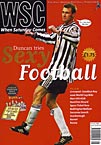 Uli Hesse-Lichtenberger assesses whether Germany could stage the 2006 World Cup
Uli Hesse-Lichtenberger assesses whether Germany could stage the 2006 World Cup
Egidius Braun, head of the German FA, was beaming. Egidius is the undisputed world champion of jovial grinners, and so it wasn’t his smile as such that was irritating, but the occasion which brought it out.
Braun was standing next to leading officials of Schalke 04, all of whom were staring at a model of a football stadium. Or rather, a model of a roofed arena, to be opened in 2001 as Schalke’s new home. “I can only congratulate the club for undertaking such an ambitious project,” said Braun. “What sceptics labelled a utopian dream is now becoming reality.”
That was when it became obvious why Braun was so delighted and why he had been invited to this ceremony in the first place. Because to him the term “utopian dream” stood for the World Cup 2006, and Schalke’s pleasure dome represents a huge step towards that goal. No matter how much Schalke’s fans hate their current ground, the building of its shiny replacement is more important to Braun than it could ever be to the club. Because the one thing the DFB (German FA) fears about England’s bid is the plethora of glittering Premiership stadia displayed at Euro 96. They may not have been full, but they were state-of-the-art, and nothing gets to those FIFA bigwigs like a touch of glamour.
As yet Germany is sorely lacking in that department, although a veritable reconstruction frenzy has broken out during the past year: Dortmund have updated their ground, and Hamburg are feverishly working on theirs; Bayern have blackmailed the city of Munich into rebuilding the Olympic Stadium, and Borussia Mönchengladbach are trying to create a spaceship akin to the Schalke thingie.
However, questions remain, especially in the eastern parts of Germany. Braun wants at least two host cities on the territory of the former GDR – and still hasn’t found one he could present to FIFA with a straight face.
Still, that’s nothing money and persistence couldn’t overcome. But there is another hitch to Germany’s bid, and it was exposed at the very place that had given Braun so much encouragement. Two days after his optimistic speech, Germany played Holland at Schalke’s Parkstadion. Before the game, new Home Secretary Otto Shily confirmed his administration would honour the promise ex-Chancellor Kohl had made to support the World Cup bid. Then the teams ran out on either side of a banner saying “World Cup 2006”, while the TV audience was treated to advertisement boards declaring (in English and German): “See You In The Heart Of Europe – 2006.” So far so good. Then the problem began – the football.
It had been over six years since the city had last seen the national team, but still only 45,ooo showed up (17,ooo below capacity), a hefty third of them clad in orange. And after all of 20 minutes many already wished they hadn’t. That’s when the catcalls began, as Germany were almost being made to look silly by the Dutch. According to the papers, “the boos soon turned into sneering laughter”. Of course Germany got away with a draw on account of what the manager called “the proverbial German virtues, such as morale and fighting spirit”. Which in a way only made it worse, because the reaction of the crowdand the press was unambiguous. The country is sick of proverbial German virtues and would like some fluent football instead.
These days few things in Germany are less fashionable than the national team, and while this could of course be subject to change, it is not something the DFB should take lightly. The fact has sunk in that we are no longer world class, and so the idea of hosting a world-class tournament is the last thing on most people’s minds. Which resembles the situation when Berlin bid for the 2000 Olympics. The city pumped millions into their campaign, while the majority of Berliners remained indifferent, or actively hostile. Predictably, the IOC didn’t like this unglamorous apathy one bit. The same could hold true for FIFA. If they want enthusiasm, they had better go elsewhere.
From WSC 143 January 1999. What was happening this month